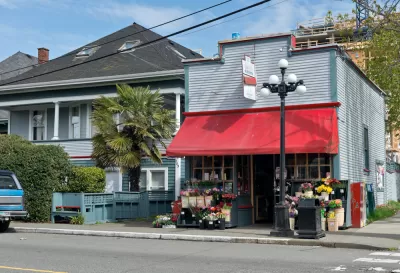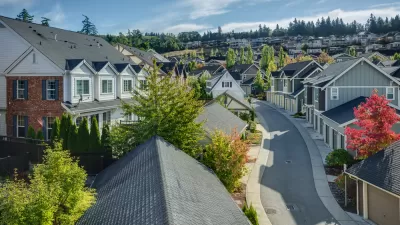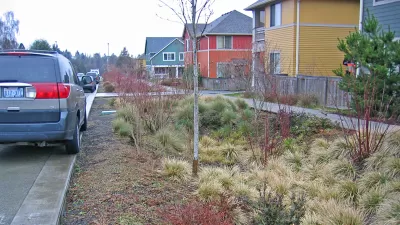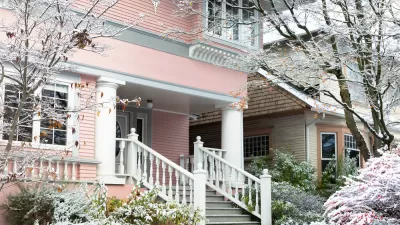Seattle's city council considers reducing 'arbitrary' and 'exclusionary' limits on home-based businesses.

In California, the humble garage-based business has been elevated to the level of myth by the Silicon Valley giants who tout their early, heady startup days working out of their home garages. With the pandemic causing tectonic shifts in how and where we work, writes Ray Dubicki in The Urbanist, garage businesses provide one more lifeline for struggling entrepreneurs and small businesses. Yet in some cities, outdated zoning codes prevent many businesses from being legally conducted in homes. In Seattle, "zoning code excludes all sorts of uses throughout the 75% of the city that’s strictly zoned for single-family detached homes." The concept of "home occupations," activists argue, is outdated and harmful to both small businesses and the vibrancy of neighborhoods.
The recent shutdown of Yonder Cider's garage tasting room illustrates the problem. In the Greenwood Urban Village where the cidery was located, "slightly higher density and commercial uses are allowed only on the single lots that line Greenwood Avenue N or N/NW 85th Street. It’s a crucifix of apartments and shops carved into a sea of single-family detached homes. Had they been on the other end of the same block, Yonder would have no problem selling cider." In order to reopen, the cidery must meet a variety of requirements that force it to "innocuously and invisibly disappear into the quaint residential fabric of its surroundings." The narrow allowances for commercial uses in Seattle's "urban villages" have the effect of reducing walkability and eliminating the potential for small local businesses in all but a small section of each neighborhood.
Opponents of the current home occupations laws argue that they are arbitrary and exclusionary, making it more difficult for people to use their property to earn income and discriminating based on occupation. A bill drafted in Seattle's city council seeks to adjust home occupations regulations by suspending parking, exterior appearance, and appointment rules for the next year and seeks to permanently lower barriers to meaningful employment and entrepreneurship. "The Bringing Business Home bill will strengthen neighborhoods and get us closer to complete neighborhoods with amenities–including childcare–for Seattle residents and families," said City Council President M. Lorena González. In Portland, a proposal for "accessory commercial units" seeks to complement the recent push for more small residential units and make neighborhoods more complete and walkable.
FULL STORY: Garage Businesses Are Keys to Covid Recovery

Study: Maui’s Plan to Convert Vacation Rentals to Long-Term Housing Could Cause Nearly $1 Billion Economic Loss
The plan would reduce visitor accommodation by 25,% resulting in 1,900 jobs lost.

North Texas Transit Leaders Tout Benefits of TOD for Growing Region
At a summit focused on transit-oriented development, policymakers discussed how North Texas’ expanded light rail system can serve as a tool for economic growth.

Why Should We Subsidize Public Transportation?
Many public transit agencies face financial stress due to rising costs, declining fare revenue, and declining subsidies. Transit advocates must provide a strong business case for increasing public transit funding.

How Community Science Connects People, Parks, and Biodiversity
Community science engages people of all backgrounds in documenting local biodiversity, strengthening connections to nature, and contributing to global efforts like the City Nature Challenge to build a more inclusive and resilient future.

Alabama: Trump Terminates Settlements for Black Communities Harmed By Raw Sewage
Trump deemed the landmark civil rights agreement “illegal DEI and environmental justice policy.”

Dear Tesla Driver: “It’s not You, It’s Him.”
Amidst a booming bumper sticker industry, one writer offers solace to those asking, “Does this car make me look fascist?”
Urban Design for Planners 1: Software Tools
This six-course series explores essential urban design concepts using open source software and equips planners with the tools they need to participate fully in the urban design process.
Planning for Universal Design
Learn the tools for implementing Universal Design in planning regulations.
City of Santa Clarita
Ascent Environmental
Institute for Housing and Urban Development Studies (IHS)
City of Grandview
Harvard GSD Executive Education
Toledo-Lucas County Plan Commissions
Salt Lake City
NYU Wagner Graduate School of Public Service





























